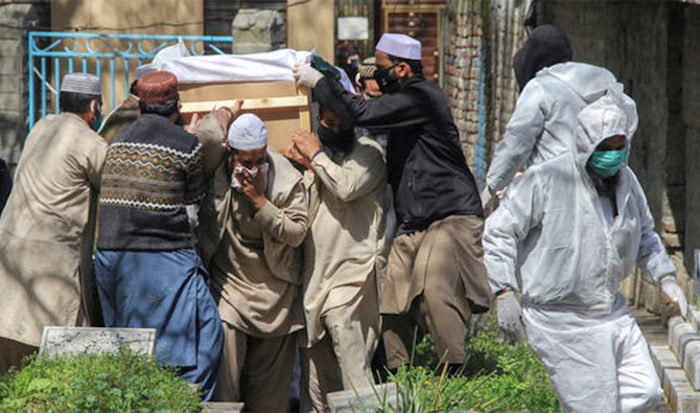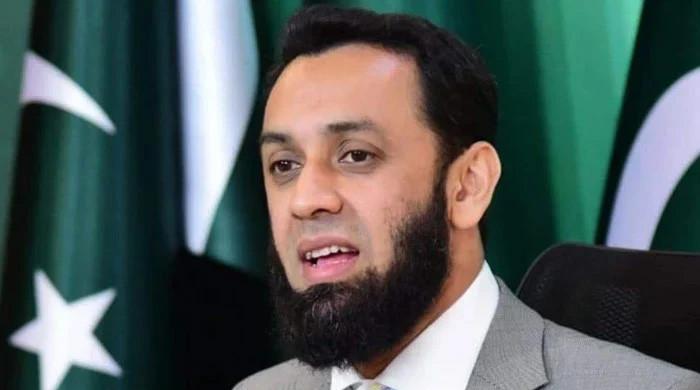Coronavirus situation worsens in Pakistan as 67 more succumb to virus
Pakistan's COVID-19 infection tally surges past 400,000 with 2,458 new cases recorded in the past 24 hours
December 01, 2020

ISLAMABAD: The number of coronavirus deaths reported in Pakistan on November 30 reached its highest in nearly five months, offering more evidence that the pandemic was gaining fresh momentum across the country as cooler weather sets in.
The data issued by the National Command and Operations Centre (NCOC) on Tuesday showed that the virus claimed 67 lives in the past 24 hours, raising the death toll to 8,091. The country's fatality rate stands at 2.0% against the global mortality rate of 2.3%.
Read more: NCOC finalises coronavirus vaccine procurement recommendations: Asad Umar
With 2,458 new infections, the country's total climbed to 400,484. There are 49,105 active COVID-19 cases in the country, out of which 2,165 are critically ill and 282 are on ventilators. At least 343,286 have recovered from the virus.
The number of new cases began trending higher over six weeks, with health experts and authorities warning that the second wave may hit harder than the first if SOPs are not followed.
Since the pandemic reached Pakistan earlier this year, a total of 5,549,779 PCR tests have been conducted across the country - 40,969 tests in the past 24 hours only.
The historical case positivity rate stands at 7.2% while today's rate is 6.0%. Azad Jammu and Kashmir has the highest positivity rate at 14.5%, Sindh is second with 10.1%, and Balochistan third with 9.4%. Islamabad reported 4.3%, Khyber Pakhtunkhwa 3.8%, Punjab 3.5% and Gilgit Baltistan 2.6%.
In cities, the highest case positivity rate was observed in Mirpur with 20.62%, followed by Peshawar at 19.58 and Hyderabad at 19.03%. Karachi recorded 13.9%, Abbottabad 11.21%, Multan 10.66% and Rawalpindi 9.27%.
Read more: Mutations, marriages or mausam — What's driving up coronavirus cases in Pakistan?
Restrictions
With the COVID-19 pandemic progressively getting worse in Pakistan, the government has placed fresh restrictions across the country to prevent the spread of the virus during its second wave.
Following recommendations by the NCOC, the federal government has made face masks mandatory in public spaces, limited large public gatherings to 300, banned indoor weddings, closed shrines, cinemas, and theatres, and instructed public and private offices to adopt work-from-home policy and 50% occupancy.
The federal government also announced that educational institutes will remain closed from November 26 to January 10. The students will study at home or get weekly homework till December 24 and winter vacations will start December 25. The schools will reopen on January 11 - which is subject to coronavirus situation then.
All examinations have been postponed except admission and recruitment tests.
Furthermore, Islamabad administration has directed the hostels to accommodate one-third of the usual number of students.
In Punjab, the provincial government has adopted smart lockdowns in at least six cities so far. All shopping malls, restaurants, offices remain closed under the lockdown.
All large gatherings have been banned, milk and meat shops have been allowed to operate from 7:00am to 7:00pm while grocery and general stores, flour mills, fruit and vegetable shops, tandoors and petrol pumps' timing are set to 9:00am to 7:00pm. Medical stores and pharmacies will stay open 24/7.
Sindh government has allowed markets and business centres to operate from 6:00am to 8:00pm on weekdays but directed them to stay shut on weekends. Only essential services will stay open on weekends.
Indoor events have been banned while outdoor events are limited to 200 guests. At weddings, closed-door marquees and buffets have been banned while food is to be served in packets and the function has to end by 9:00pm. All cinemas, shrines, theatres, and gym will stay closed.
In Karachi, indoor dining has been banned but restaurants are allowed to provide dine-in facilities in open spaces. Delivery is allowed beyond 10:00pm as well.
In Balochistan, the provincial education department announced early and extended winter vacations last week. Educational institutes will remain closed from December to February.
Khyber Pakhtunkhwa government has banned indoor weddings and limited outdoor gatherings to 300 guests. All shopping malls, markets, restaurants, and wedding halls have been directed to shut by 10:00pm. Public parks and recreational spots will close by 6:00pm. Essential services, pharmacies, tandoor shops, and petrol pumps will remain open 24/7
Azad Jammu and Kashmir government has imposed a 15-day lockdown on November 20 under which all public gatherings have been banned. All businesses and offices are closed while the government offices will operate at 50% capacity. Only essential services are allowed with strict implementation of coronavirus SOPs. The government has closed down schools. It is also requesting locals and Kashmiris based abroad to avoid travel.
Read more: With 3,000 new cases, Pakistan's coronavirus tally crosses 380,000
Corona vaccine
After Prime Minister Imran Khan green-lighted advance booking of the COVID-19 vaccine, the Economic Coordination Committee, headed by Advisor to PM on Finance Dr Abdul Hafeez Shaikh, approved a $150 million grant to secure the purchase.
Federal Minister for Planning and Development Asad Umar said on Monday that the NCOC has finalised recommendations for the procurement of coronavirus vaccines. "NCOC today finalized its recommendations for procurement of COVID vaccine," tweeted Umar, who also chairs the national body. "These will be presented to the cabinet tomorrow for approval."
The minister said the recommendations were developed by a task force of experts headed by Special Assistant to PM on Health Dr Faisal Sultan.











